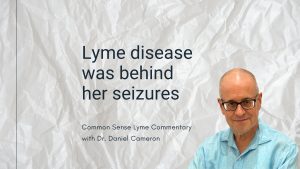Call for your appointment today 914-666-4665 | Mt. Kisco, New York

Patients with autoimmune disorders are at risk for POTS, along with individuals who have had a viral illness or a serious infection, such as Lyme disease. In fact, POTS and Lyme disease patients often present with similar symptoms.
For instance, POTS patients frequently report having “brain fog,” also a common complaint among Lyme disease patients. In a recent article, Miller and colleagues point out that “many patients with POTS experience subjective cognitive complaints or “brain fog” with reports ranging from 43% to 96% in the literature.” ¹
“Brain fog is described in POTS as ‘forgetful,’ ‘cloudy,’ and ‘difficulty focusing, thinking, and communicating’ suggesting impairment in multiple cognitive domains including executive function, attention, and memory,” the authors explain.
Kanjwal and colleagues describe several cases of patients with POTS and Lyme disease in their article “Postural orthostatic tachycardia syndrome following Lyme disease.” ²
Another study by Wells et al. points out that POTS symptoms are often reported by patients with chronic fatigue syndrome and fibromyalgia. The authors did not, however, mention POTS and its association with Lyme disease. ³
For the first time, investigators examined cognition in POTS patients when they were actively standing. “Most previous studies have reported normal cognition in POTS in the supine posture with impairment in measures of attention, executive function, and working memory in the seated posture or with head-up tilt,” writes Miller.
Cognitive function in POTS patients
The researchers recruited 87 individuals with self-reported POTS who were attending a 2018 Dysautonomia International Conference. The participants included 24 adolescents (age range: 14-19 years) and 63 adults (age range: 20-59). Thirty-nine healthy controls were also recruited.
READ MORE: What exactly is POTS — postural tachycardia syndrome?
“POTS is defined by an increase in heart rate from supine of at least 30 beats/ min in adults (> 40 beats/min for age 12–19) within 10 min of standing or head-up tilt and associated chronic orthostatic symptoms including fatigue, lightheadedness, nausea, and palpitations,” explains Miller.
Investigators looked at measures of executive function using a Stroop word-color test and attention using CogState Identification tests while in supine and standing postures.
Study findings
They found that 1 in 4 POTS subjects exhibited clinically meaningful impairment in executive function while standing, writes Miller.
Furthermore, POTS subjects experienced impairments in cognitive function even when they continued taking their medications, “with the majority demonstrating well-controlled orthostatic tachycardia.”
Attention scores were higher (worse) in the standing versus supine posture. However, cognitive impairment did not differ between adolescents and adults.
“Overall, we found that executive function and attention are impaired in POTS during active standing when compared to healthy controls of similar age, sex, and education level,” the authors conclude.
The study was not designed to measure all aspects of cognitive function.
Editor’s note: The study’s findings suggest these adolescents and adults might have problems with impaired cognitive function in school, the workplace, and at home.
We need to address the question: “Could Lyme disease patients with POTS suffer impaired cognitive function when standing?”
Related Articles:
What exactly is POTS: postural tachycardia syndrome?
Could advanced imaging reveal cognitive impairment in Lyme disease patients?
References:
- Miller AJ, Sheehan T, Bourne KM, Feeley M, Arnold AC. Attention and executive function are impaired during active standing in postural tachycardia syndrome. Auton Neurosci. 2020;227:102692.
- Kanjwal, K., et al. (2011). “Postural orthostatic tachycardia syndrome following Lyme disease.” Cardiol J 18(1): 63-66.
- Wells, R., et al. (2018). “Postural tachycardia syndrome: current perspectives.” Vasc Health Risk Manag 14: 1-11.




Thank you Dr. Cameron for this great write up for POTS.
Late-stage Lyme sufferers and many silent illness sufferers can get great value here as your articles tend to do.